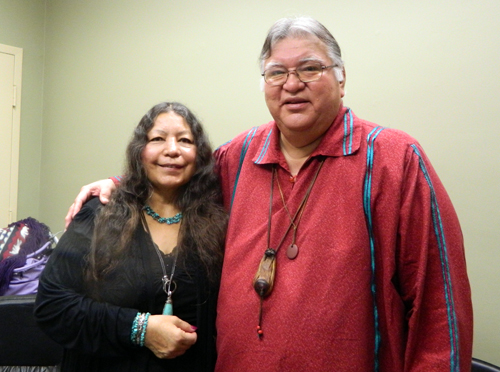
Education, says Dan Smoke, is the new buffalo.
“The buffalo used to be essential to the aboriginal way of life,” he explains. “It provided what we needed to survive. Today, we need education to survive.”
But the process of getting that education can sometimes feel daunting to aboriginal students. That’s why the Aboriginal Resource Centre (ARC) was established at U of G, and that’s why Dan Smoke, his wife, Mary Lou, and others from the community make regular visits to the ARC.
The Smokes, who live in London, Ont., visit other schools as well, making stops at the University of Waterloo, Trent University and the University of Toronto, and have been involved with ARC since it was created 10 years ago.
“We bring traditional medicines, we smudge people, we sing with people and we offer traditional forms of counselling,” says Mary Lou. Her husband will sometimes recite traditional prayers he learned from his grandmother. Smudging involves using smoke from burning herbs to cleanse and remove negative thoughts and energy.
Dan believes that it is vital for aboriginal students to maintain their cultural identity and remember why they are attending school. Otherwise, the material they learn in class can damage their sense of themselves. “For example,” he says, “some history courses will say that the Europeans came to Upper Canada and conquered the native people, but they were not conquered. None of us surrendered our land. We are a sharing people and we signed the treaties agreeing to share.”
In addition to being a resource for students, the Smokes also work with faculty who are interested in developing a better understanding of aboriginal issues and of students with aboriginal heritage.
They’d love to see programs in Ontario like those recently introduced in Saskatchewan that teach native studies in public schools. “It’s good for both native and non-native students to be learning about the native history and cultures,” says Dan. “We’ve talked to students from Saskatchewan who have come here, and they appreciate having that background, but this is not taught in Ontario.”
The Smokes usually visit ARC once a month; appointments to meet with them for counselling or conversation can be arranged through Cara Wehkamp, ARC manager. They are sometimes on campus for ARC’s soup and bannock gatherings on Wednesday afternoons.
Dan stresses his connections with ARC in his invitation to aboriginal students to drop by for a talk or some advice: “We want the students to know we are here for them. This is a home away from home.”
Anthony (Tony) Chegahno, who lives in Neyaashiinigmiing, Ont., north of Owen Sound, is another elder who regularly visits ARC and helped establish its “Learning on the Land” program. “I’ve been coming quite steadily for the past five years,” he says. “I am quite impressed by what the ARC offers students.” Chegahno sometimes visits with students at the ARC, but when time permits, he likes to take them for walks in the Arboretum.
“I think the oneness between human beings and non-human beings, between us and all of nature, is so important. When you don’t have it, you lose so much,” Chegahno says. He feels that this connection with nature is a big part of what the University of Guelph stands for through campaigns such as The BetterPlanet Project.
Chegahno’s approach is a simple one. “I’ll walk with the students in the Arboretum and talk to them about my view of nature. We’ll listen to birds, watch for the animals, get to know the trees. Sometimes humans start to think they are superior to trees – but we need trees for our very existence. If we lose our appreciation for nature, we lose our appreciation for mankind.”
When he spends time with students, he’s always careful to respect their need for time to study and write or do research. “All education is important, whether Western science or traditional knowledge. We need to be willing to look at each other’s knowledge so we do our best to help nature and other human beings.”
Chegahno adds that he is deeply appreciative of the dedication and hard work of the ARC staff, who provide considerable support and help make connections for aboriginal students. “I am truly, truly impressed by what they offer.”